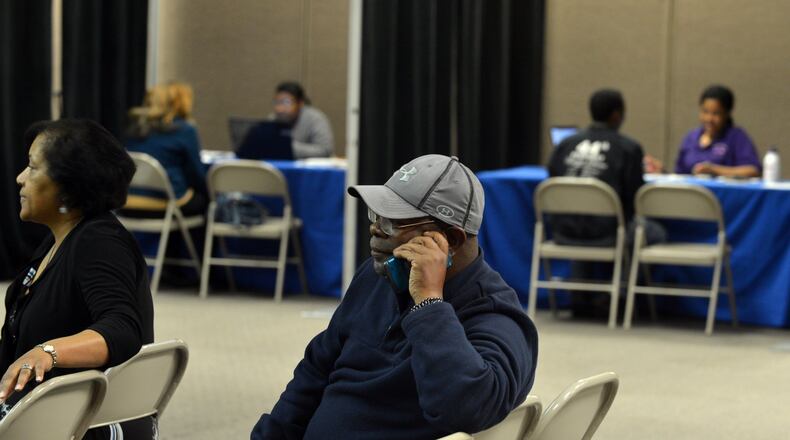Enrollment extensions
Tried to enroll but couldn’t? It may not be too late. Consumers who tried but failed to sign up by the deadline may be eligible for a special extension. Some of those reasons include (but aren’t limited to):
- Technical problems on HealthCare.gov
- Those having to wait in line to access the site because of high demand
- Insurance company errors
- Mistakes by application counselors
- Missing information
If you think you qualify for an extension, call the federal Health Insurance Marketplace at 1-800-318-2596.
Procrastinators across Georgia who waited until the last minute to sign up for health coverage on the federal Health Insurance Marketplace may have found themselves out of luck when the clock struck midnight.
A surge in user traffic and technical glitches at HealthCare.gov on Monday — the last day to enroll in marketplace plans for this year — created some roadblocks for those hoping to beat the deadline.
“The site has been up and down,” Dante McKay, Georgia state director for the nonprofit Enroll America, said Monday afternoon. “There’s a record number of people online trying to get enrolled.”
But there’s still hope.
Georgians who tried but failed to enroll in coverage by 11:59 p.m. Monday because of technical troubles, missing information or selected other reasons may be eligible for a special extension. It’s not yet clear, however, what the deadline for those extensions will be.
Nearly 178,000 Georgia residents have signed up for private health insurance on HealthCare.gov since its Oct. 1 launch, state data show. About 80 percent of them have made their first premium payment. Nationally, an estimated 6 million people had signed up for coverage before the weekend.
“We always looked at this as more of a marathon than a sprint,” McKay said. “It is such a huge fundamental change.”
The site problems Monday were a nasty echo from 182 days ago, when the site launched and almost immediately crashed.
The marketplace is critical to the Affordable Care Act’s goal of extending coverage to millions of uninsured Americans who don’t get insurance through work. Consumers could choose from dozens of health plans offered by private insurers and find out if they qualify for federal tax credits to lower their monthly premiums.
Monday marked the last day to enroll in a plan until the next open enrollment period in the fall.
Lithia Springs resident Kevin Darity was one of scores of people rushing to meet that deadline who showed up to get help from health insurance “navigators” — workers specially trained to guide insurance shoppers through the process — during an enrollment drive at World Changes Church International in College Park.
Darity, 53, a father of five who works in home construction, went without health insurance for 16 years. He said he searched for individual plans in the private market but couldn’t afford the $300 to $500 monthly premiums he was quoted.
On Monday, however, Darity signed up for a silver plan that covers him, his domestic partner and two of their children for less than $100 a month after federal tax credits are factored in.
“It’s such a relief,” Darity said of having health insurance. “You don’t have to sit around and suffer and hope it doesn’t turn out worse that it is.”
Sign-ups on Monday got off to a rocky start as a software bug forced technicians to shut down HealthCare.gov for nearly four hours in the morning.
By midafternoon, 1.6 million consumers had visited the site, and by 4 p.m. call center volume had topped 840,000, a one-day record, said Fabien Levy, a spokesman with the U.S. Department of Health and Human Services. A virtual waiting room set up to handle high user demand allowed people to hold a place in line and be let onto the site as space opened up.
“The waiting room is up to meet demand,” Levy said. “Consumers may wait or may leave their email and they will be invited back.”
Georgia is one 34 states that decided to let the feds run some or all of their insurance marketplaces.
At Atlanta Medical Center’s south campus in East Point, the website seemed to be working smoothly and navigators had signed up a couple of dozen people by early afternoon.
Tenet Healthcare, which owns the hospital and three others in metro Atlanta, said it has helped answer questions for more than 3,800 people and signed up about 600 for coverage during the six-month open-enrollment period.
Waiting until the last minute is just human nature, said Amanda Ptashkin, a navigator with the nonprofit Georgians for a Healthy Future. Signing up for marketplace coverage is no exception.
In recent weeks, Ptashkin began fielding 15 or so consumer phone calls a day, versus the usual two or three. It’s been hectic trying to keep up with voice-mails and fitting appointments into her jam-packed schedule.
“It’s stressful,” she said. “Then you have that moment when you get someone a really great plan. You know what it means for them and their families and it’s all worth it.”
About the Author
Keep Reading
The Latest
Featured


